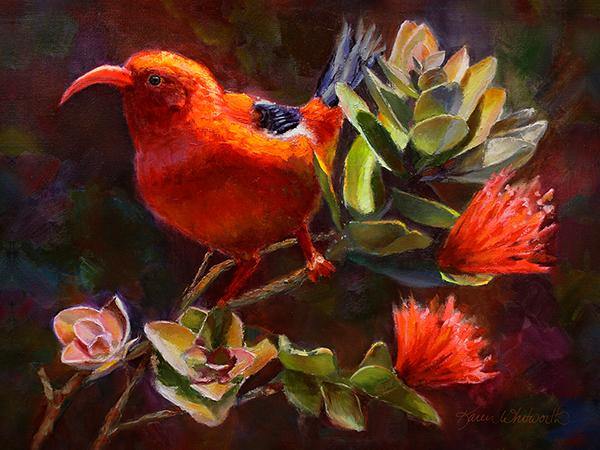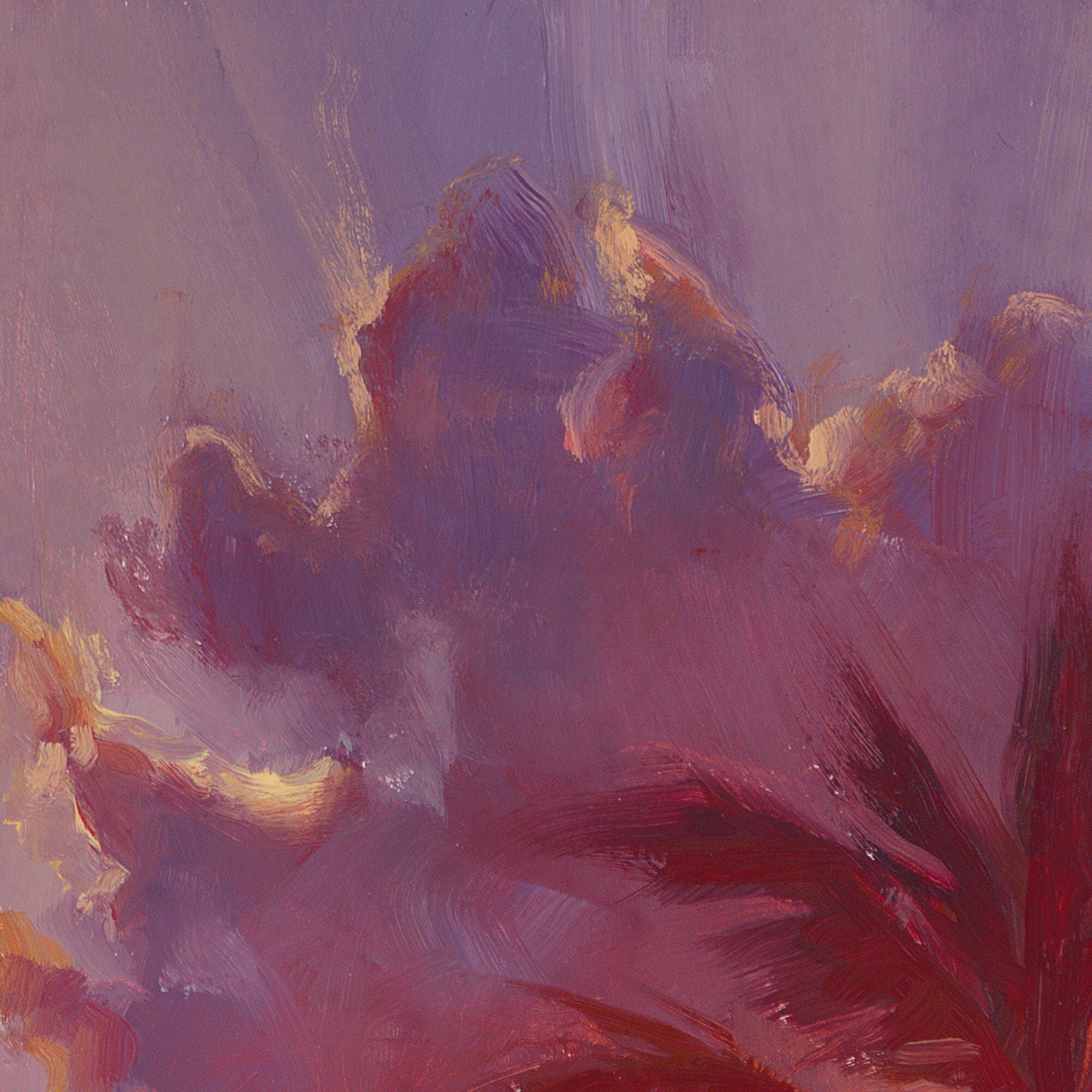Join travel writer Sarah Etinas, Hawaii local and travel extraordinaire, for this stroll through the gardens and forests of the Islands of Hawaii. She covers the names of many common Hawaiian flowers, Hawaiian legends, ancient medicinal and traditional uses for these exotic plants, and more.

Hawaiian Plants
Native Species or Transplants?
The Hawaiian Islands are filled with many beautiful Hawaiian plants, some of which can only be found in Hawaii. While some were introduced, many are native to the Hawaiian Islands and still continue to grow today.

‘Ohi‘a Lehua Tree
The ancient Hawaiians were a very resourceful group, as can be seen by their use of the ‘ohi‘a lehua tree. The leaves were used for medicinal purposes, and the bark was used for everything from beating kapa cloth to pounding poi.

The 'Ohi'a Lehua Legend
One of the most interesting things about this Hawaiian plant is the Hawaiian legend associated with it. Once upon a time, there was a man named ‘Ohi‘a, who attracted the attention of the fire goddess Pele. But ‘Ohi‘a only had eyes for a woman named Lehua, and Lehua only had eyes for ‘Ohi‘a. In a fit of jealousy, Pele turned ‘Ohi‘a into a nasty, gnarled plant that became known as the ‘ohi‘a tree. The gods then took pity on Lehua and turned her into a beautiful red flower on the ‘ohi‘a tree, so that the two of them could never be separated again.
A New Threat to 'Ohi'a'
In ancient times, the ‘ohi‘a lehua tree was one of the most resilient Hawaiian plants. It would be the first to grow in the dry, harsh landscapes of lava rock right after a fresh lava flow. Today, though, the ‘ohi‘a lehua tree is struggling. Currently, two types of bacteria, Ceratocystis huliohia and Ceratocystis lukuohia, plague the plant, and there is no cure. To avoid spreading these bacteria, make sure to leave ohia plants unharmed! Openings in the ‘ohi‘a plants’ outer bark can become entry points for these destructive bacteria.
"I'iwi and O'hi'a Lehua" Hawaiian flower painting by Karen Whitworth
‘Ilima Flower

The ‘ilima blossom is the official flower for the island Oahu. This tiny, yellow flower is indigenous to many Pacific Islands, not just the Hawaiian Islands. Regardless, the ‘ilima was highly valued in ancient Hawaiian culture. As a matter of fact, it was actually one of the only plants that the ancient Hawaiians purposefully planted and cultivated. After all, the ‘ilima blossoms are so small that takes 500 to 1,000 flowers to create a single-stranded lei!
In ancient times, the ‘ohi‘a lehua tree was one of the most resilient Hawaiian plants. It would be the first to grow in the dry, harsh landscapes of lava rock right after a fresh lava flow. Today, though, the ‘ohi‘a lehua tree is struggling. Currently, two types of bacteria, Ceratocystis huliohia and Ceratocystis lukuohia, plague the plant, and there is no cure. To avoid spreading these bacteria, make sure to leave ohia plants unharmed! Openings in the ‘ohi‘a plants’ outer bark can become entry points for these destructive bacteria.
Hibiscus Flower

Hawaii State Flower
The hibiscus is one of the iconic Hawaiian plants, as the yellow hibiscus is the state flower of Hawaii. There are many different variates of hibiscuses in many different colors, including red, white, pink, and orange. To the ancient Hawaiians, these flowers were treasured more than just for their beauty.
"Past Present Future" yellow hibiscus - Hawaiian flower painting by Karen Whitworth
A Hawaiian Medicinal Plant
The ancient Hawaiian people used hibiscuses for a variety of medicinal purposes, including to treat stomach irritation, colds, and blood pressure. The flowers were also used for dye, and the bark was used for hula skirts and wigs.
"Radiance" Tropical hibiscus painting on canvas by Karen Whitworth
Plumeria Flower
A favorite of the Hawaiian Islands

While most of the Hawaiian plants on this list are native to Hawaii, plumerias are not. There are dozens of varieties of plumerias found in Hawaii, ranging from white to yellow to orange, pink, even rainbow plumeria. The most popular type is a white flower with a spot of yellow on the inside. Many of these plumeria varieties can be found in the plumeria grove at Koko Crater Botanical Garden.
"Paradise Delight" rainbow plumeria painting by Karen Whitworth
Aromatic Plumeria Leis
The beautiful, aromatic flowers originally became a symbol of Hawaii, because they were used in most leis given to tourists. Today though, plumeria leis are hard to come by, as they have been replaced by leis made of purple and white orchids.
"Heavenly Scent" yellow plumeria painting on canvas by Karen Whitworth
Tropical Bird of Paradise Flower
An Exotic Transplant

Just like the plumeria, the bird of paradise plant is not native to Hawaii. This rainbow-colored, bird-shaped flower is often the first thing people think of when referring to tropical Hawaiian plants. This eye-catching plant actually grows wild on many of the Hawaiian Islands!
"If Looks Could Kill" Orange Bird of Paradise flower painting by Karen Whitworth
Haleakala Lobelia
Rare Maui Flowers
The Haleakala lobelia may be one of the rarest Hawaiian plants. This bluebell variation can only be found in the most remote gulches of Maui. But it’s quite the sight to see, especially if the endangered Amakihi bird happens to be gathering some nectar from the Haleakala lobelia.
"Amakihi and Haleakala Lobelia" Hawaiian flowers painting by Karen Whitworth
Kukui Nut Tree
The source of the iconic Hawaiian Kukui nut lei

Kukui Nut Photo by Daniel Ramirez

Hawaii State Tree
The kukui nut tree, also known as the candlenut tree, is one of the most interesting Hawaiian plants. It is actually the state tree of Hawaii. Today, kukui nuts are most commonly known for their use in leis. There are both brown and white versions of kukui nuts, but white kukui nuts are very hard to come by.
Photo by Scot Nelson
Kukui Oil to Candlenut
Video by John Poon
Candle light by Kukui Oil
The kukui nut tree got its alternate name as the candlenut tree from the fact that the ancient Hawaiians used to light these nuts as candles. Each one has enough oil to last two to three minutes, so, when combined with hundreds of others, the kukui nuts could provide light for hours!
Photo by Kim and Forest Starr


Kukui Leis and Traditional Uses of the Candlenut Tree
But that wasn’t the only purpose the ancient Hawaiians had for this precious Hawaiian plant. The nuts and bark were also used to dye traditional Hawaiian kapa cloths for hula and traditional ceremonies.
Koli'i
One of the uncommon Hawaii flower names

"Amakihi and Koli'i" Hawaiian flower painting by Karen Whitworth
Beautiful Pink Hawaiian Flowers
When the koli‘i flower blooms it is one of the most beautiful Hawaiian plants. These bright, contrasting pink flowers bloom in bunches from November to February, when the rest of Hawaii’s landscape is bright green from the rain. These flowers are most commonly found in the remote areas of the Koolau Mountains of Oahu, but they can also be found on Molokai and Maui.
Mokihana From Kaua'i
One of the uncommon Hawaii flower names

Receiving a Kauai Mokihana Lei is a great honor.
The island of Kauai has a signature lei made of bright green, anise-smelling marbles from the mokihana plant. To receive one of these mokihana leis is truly a great honor in local culture.
Do know that the sap inside the mokihana berries can cause severe skin rashes, so be sure to place it over clothing.
Haleakala Silversword 'ahinahina
One of the rarest Maui flowers.
Truly unique Hawaiian tropical flowers
The Haleakala Silversword is endemic to the slopes of Maui’s highest peak. In other words, the Haleakala Silversword is extremely rare and can only be found on Haleakala. When the golden glow of a Haleakala sunrise shines on these Haleakala Silverswords, they are stunningly beautiful. These plants can live for up to fifty years but flower just once, right before they spread a bunch of seeds and die.
Photo by Kim and Forest Starr


Treating Hawaiian plants with respect
One of the reasons the Haleakala Silversword is so rare is because many tourists will get too curious and end up pulling out parts of the plants in the process. If you do see these endangered plants, remember to look but don’t touch!
Whether you use this article as a virtual escape to paradise, or Hawaiian flower research and ideas for future travel to Hawaii, (and everything in between) we hope you enjoyed Sarah's collection of Hawaiian plants and flowers.
If you did enjoy it, save it for later with the links below, or post it to your favorite platforms.
Thanks for sharing the love! :)
MEET THE AUTHOR
Sarah Etinas
Travel writer and wildly knowledgeable Hawaii local. Check out her blog where she shares all her Hawaii travel tips. Sarah has also launched a new free resource for Hawaii visitors. It is a great place to plan for your upcoming trip to paradise.
Check it out here: https://hawaiihopper.com/


This post includes affiliate links. Some purchases made after clicking an affiliate link may bring us a small benefit.

Copyright - This blog is property of karenwhitworth.com Please include links to this page if you share our content. Thanks!
From big beautiful Hawaiian hibiscus flowers, to deliciously aromatic plumeria flowers, we have a stunning gallery of beautiful flower paintings to feast your eyes on.











Leave a comment